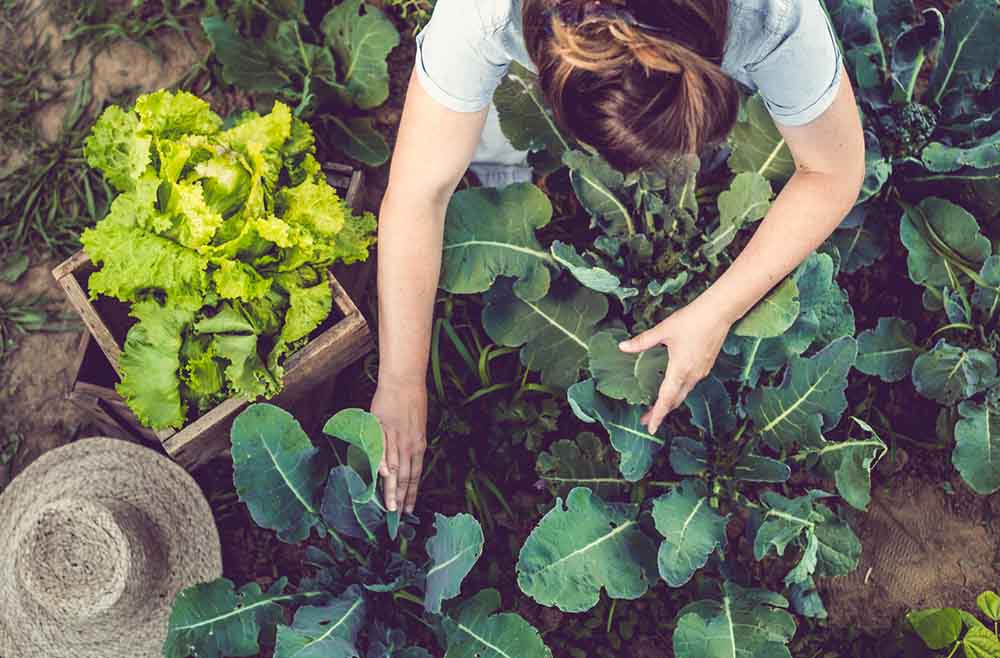Trying to get pregnant? In this week’s Ask The Gynaecologist weekly series, consultant gynaecologist Dr Larisa Corda brings you 12 ways to increase fertility
When it comes to trying for a baby, everyone is after that magic formula. But in truth, there is no simple solution that fits everybody. The best approach to improving fertility looks at several factors that work together to help make you and your partner the healthiest you can be. Some of this will involve work on your body, your relationship with both yourself and your partner and also, very importantly, with your mind.
Tip #1 Choose organic produce
Eating organically and seasonally means you’ll know the produce is far less likely to have been influenced by hormones, pesticides, added preservatives, chemicals and additives that are rich in sugar.
You need to get strict about what you’re putting inside of yourself as it literally influences what you conceive. All of the above can have serious and harmful effects on your own body but also, as recent epigenetic studies are showing, can be harmful in terms of influencing the development of your baby and their health later in life.
Choose food in its most nutritious and natural state possible, which means buying organic where you can and not over-processing or over-cooking the ingredients, and having a predominantly plant based diet of seasonal and colourful fruit and veg – the darker the skin, the better the antioxidant value.
Tip #2 Quit smoking and minimise alcohol
If you smoke and you want a baby, you absolutely need to stop smoking (even e-cigarettes, though the evidence for this is not yet uncovered) as this can cause damage the lining of the womb, the eggs and sperm. It can also adversely affect the health of your child, not to mention cause all sorts of complications in your pregnancy.
You also need to minimise alcohol or ideally avoid it altogether, though having said that, a glass or two of wine is unlikely to cause any harm and could help with stress relief.
The liver is the main organ in the body responsible for processing toxins. If the liver is preoccupied or overburdened with processing alcohol or cigarette toxins, then it can’t do one of its other major jobs which is to clean up any substances or hormones made in the body that need to be deactivated, otherwise they themselves start to have harmful side effects on your fertility.
A liver incapable of detoxing can also lead to excess oestrogen in the body and lowered levels of progesterone, the combination of which is not conducive to fertility.
Tip #3 Get a grip on stress
Stress reduction and keeping caffeine (which is a stress activator) to a minimum or avoiding it altogether is important to your fertility. It’s ironic, because being unable to conceive naturally can be one of most stressful situations people can ever face in life.
Though there is no direct association between stress and impaired fertility – this is difficult to prove because so many other factors are also at work – there is a wealth of literature showing too much stress activates the sympathetic or fight or flight response, leading to raised levels of the hormone cortisol and a permanent state of high alert.
This can then start to create an imbalance in your fertility hormones, but in addition, can affect other organs in your body, leading to high blood pressure, problems with sleep, lowered libido and can often lead people to resort to unhealthy lifestyle choices to help us cope with it, such as eating too much sugar for comfort, drinking alcohol, or smoking.
It becomes a vicious circle and if you stop to consider it, when your body perceives a state of stress, the last thing it’s going to want to invest in is pregnancy, because its functions are preoccupied with protecting you rather than creating new life.
Meditation, yoga, mindfulness, being outdoors in nature, having a bath, or spending time with close friends can all help. Acupuncture, reflexology, hypnotherapy and reiki have also been shown to be beneficial.
Tip #4 Make your bedroom a sanctuary for a blissful sleep
Sleeping well and ensuring your bedroom becomes a sanctuary that is conducive to sleep is important because you need enough rest to support your physical, mental and emotional health – all of which impact your fertility.
This means clearing out the clutter, not using any electrical devices such as TVs and mobile phones before bed time, and ensuring the room is dark enough to allow you to get the crucial 7-8 hours sleep a night.
You can also use beautiful natural candles in the room, especially those with the scent of lavender, as well as a natural face oil, a naturally sourced pillow spray and hand cream, all of which can become a beautiful bedtime ritual that helps with preparing your mind and body for sleep.
Sleep not only helps to combat stress, and improve libido, it’s also vital to processing unnecessary and harmful substances in the body that are made each day, helps to keep you lean and trim, and also boosts immunity, something else that’s really important when it comes to fertility.
Tip #5 Check your gut health
On the theme of immunity, there is growing recognition of the importance of the microbiome within our bodies and how important this is to our overall health and fertility, as well as influencing the baby’s immunity and health.
Take a probiotic supplement and consider eating more fermented foods to help, like sauerkraut, which is great in winter. Your gut is often referred to as your second brain, because so many substances made in the brain are also made in the gut, including serotonin. We need this to help enhance our overall sense of wellbeing, so looking after the microbiome is important for this too.
If you have gut problems or IBS, click here to read our doctor’s guide to the the small changes that can help your gut health.
Tip #6 Choose natural contraception
If you have been on a long term contraceptive, in particular the oral contraceptive pill, be aware that it may cause deficiencies in certain vitamins and minerals that your body requires for optimum fertility, which is even more reason to eat nutritiously and take a good multi vitamin supplement.
In addition, the oral contraceptive pill can cause imbalances in a range of different hormones, that can take some time to regulate and return to their optimum state.
If you are looking towards pregnancy soon, try to consider alternative, more natural means of contraception during that time, and discuss with your doctor, such as natural cycle monitoring, which will also encourage you to understand your own body better and its pattern of behaviour.
Tip #7 Don’t forget to exercise
Exercising regularly will help boost circulation to your reproductive organs and also help you maintain a healthy body and mind. And, while exercise can help to reduce stress too much or being over vigorous can do the opposite and increase your levels of stress, so be mindful and aim for that which is realistic and achievable for you.
This will also help you to keep weight within the normal range that is vital for fertility and helps to reduce your chances of miscarriage. Remember, this is your chance to create and tone your body in preparation for pregnancy.
Physical activity also gives you an excuse to get out into the great outdoors and spend time soaking up the Vitamin D which then helps to improve fertility in both men and women. Exercise is also known to increase levels of serotonin which helps stave off depression and also to suppress appetite, allowing us to make healthier food choices.
Whether you go for a jog, a walk, a swim or you do the gym, make sure you choose something that you find pleasurable.
Tip #8 Have more sex
It sounds obvious but you need to have sex often and throughout your cycle. Yes, the fertile window is important in terms of optimising chances of fertilisation and the egg is exposed to the sperm, but the trouble is that people can become too stressed and focused on just this time and sex can become a militaristic operation rather than a pleasure.
As long as you’re having sex several times a week, there will be sperm available to fertilise the egg, as sperm can survive in the reproductive tract for several days. In fact, recent studies are suggesting that the conventional advice of abstaining for a few days in between is perhaps overcautious and that sperm quality may actually improve with more regular sex.
So, be spontaneous and remember to enjoy sex. Orgasm may be helpful in aiding fertilisation and having sex in the lead up to ovulation is now being shown to be beneficial to boosting immunity that makes pregnancy more likely to happen, so there are plenty of reasons to have sex.
Tip #9 Try a multivitamin
Get yourself on a good multivitamin supplement a few months before you start to try for a baby, but remember that this is not an alternative to a good diet, the two must go hand in hand.
For men, a supplement rich in antioxidants like vitamin C, E, selenium, zinc and garlic can support healthy sperm.
Women should look towards a vitamin supplement that delivers the required dose of folate, iodine and vitamin D and a range of other vitamins and minerals required for conception and a healthy pregnancy.
In fact, a clinical trial on 58 women showed that women those who were taking prenatal multivitamins have a higher chance of pregnancy.
The results of this randomised controlled clinical trial published in the Reproductive BioMedicine Online show that women having fertility treatment have significantly higher pregnancy rates when taking a specific conception multivitamin formula, Pregnacare-Conception Vitabiotics, compared with those taking folic acid alone.
The trial also showed that women taking the multivitamin supplement achieved pregnancy in significantly fewer attempts
Almost 70 percent (66.6 percent) of women became pregnant in the multivitamin group compared with almost 40 percent (39.2 percent) of women in the folic acid group.
The ongoing pregnancy rate (confirmation of a viable pregnancy with a foetal heartbeat on ultrasound examination after 12 weeks of pregnancy) in women on the prenatal multivitamin supplement was 60 percent as compared to 25 percent in the folic acid group.
The trial also showed that women taking the multivitamin supplement achieved pregnancy in significantly fewer attempts compared with women on folic acid alone. (Try Vitabiotics Pregnacare-conception)
Omega 3 fats are also important for both men and women as they influence the development of the baby’s brain and IQ. These are only found in oily fish, so if you don’t get two portions a week, try supplementation.
Also take a look at the NHS guidelines for fish and shellfish in pregnancy, as some oily fish choices are not as good as others because of their high mercury content.
Tip #10 Watch out for environmental toxins
Be mindful of the toxic elements influencing our environment, from the water we drink, to the toxins found in cleaning products, to the make up we put on our skin, to the plastic we use to cover our food in.
Whether we absorb the toxins via the gut or the skin, or in some cases inhale them around the house, the combined surface area of these organs is massive, and whatever is absorbed can get into our blood stream and end up being harmful to the hormones in our bodies that control fertility, as well as the eggs and sperm.
The average woman carries over 120 toxins each day, and that can come as a result of anything from the products she uses on herself to the air she inhales. There are so many pollutants that we cannot avoid being exposed to when we step outside, but we need to be addressing the environment where we can, inside our homes, as well what we put into and on to our bodies.
Do what you can to make small changes to the number of chemicals your body is exposed to from food, cleaning products, plastics and pollution. This will help lower your overall toxic load; that’s the total number of harmful toxins you’re exposed to.
Always try and use products in their most natural state because again, much like with food, the repercussions are not only on our own bodies and health, but on our babies’ health too and their development.
Some recent studies have also shown that toxins influencing sperm DNA can even be passed on to offspring; an effect that has been linked to obesity and other health issues in the child.
Tip #11 Detox the bad people out of your life
There is a saying that we become the five people we spend the most time with, so make sure you chose people who bring you nourishment and joy, who support and care for you and take the time to connect with them.
For all those that don’t, or who judge you, make sure you detox them out of your life, much the same as you’re doing with your environment. Toxic friendships are just as harmful.
Tip #12 Start some daily rituals
Invest in daily rituals that bring you joy and comfort. Make having a mug of tea or a warming drink an occasion to look forward to, tucked up in bed before you go to sleep or whilst reading a book.
Herbal teas are rich in polyphenols that your gut bacteria love and matcha tea has an amino acid called L-theanine that can help to reduce stress and anxiety.
Also, make bath time a ritual before bed time using natural aromatherapy oils and Epsom bath salts, that when added on a regular basis, can help your body to detox.
In addition, be mindful of hard water that epidemiological studies are showing may impact a range of health conditions, including reproductive and cardiovascular health. Investing in an effective water softener would be wise to help with this, as well as limescale build up.
Dr Larisa Corda is a Consultant in Reproductive Medicine. She qualified from Imperial College London and her training has been both in the UK and Australia, seeing her gain an understanding and appreciation of gynaecological, obstetric and fertility issues across a wide international population.
She currently works for CREATE using natural and mild IVF techniques to assist conception where needed, is ITV This Morning’s and Channel Mum’s Fertility Expert, regularly appears and is quoted by the media, and has several research interests, some of which have been published.
She is also brand ambassador for My Lotus, a new ovulation device, and has launched her own website which offers guidance and support for all those wanting a natural empowering approach to their fertility. You can follow her on Instagram and Twitter.
More Healthista Content:
Kate Hudson’s personal trainer reveals her secrets of lasting weight loss
7 easy success hacks this neuroscientist does every day
Got IBS? 18 tiny life changes Britain’s leading gut health expert says will help
Like this article? Sign up to our newsletter to get more articles like this delivered straight to your inbox.





























































